If you’re a healthcare professional or someone interested in pursuing a career in the medical field, having a strong grasp of medical terminology is essential. Our comprehensive medical terminology course is designed to help you master the language used in the healthcare industry.
With our self-paced online course, you can learn at your own pace and explore the terminology used in all 10 major organ systems. Whether you’re a beginner or looking to improve your existing knowledge, our course is beginner-friendly and taught in English, making it accessible to anyone.
By enrolling in our medical terminology course, you’ll gain a deeper understanding of medical language, including anatomy, abbreviations, prefixes, and suffixes. This foundation will enable you to decipher complex medical terms more effectively, enhancing your overall communication skills in the medical field.
Key Takeaways:
- Our medical terminology course is designed for healthcare professionals and individuals interested in pursuing a career in the medical field.
- Learn at your own pace with our self-paced online course, suitable for beginners and those looking to improve their medical terminology skills.
- Explore the terminology used in all 10 major organ systems, allowing for a comprehensive understanding of medical language.
- Gain a strong foundation in medical terminology, including anatomy, abbreviations, prefixes, and suffixes.
- Enhance your communication skills and decipher complex medical terms effectively with our course.
Introduction to Medical Terminology
In this section of the course, you will be introduced to the basics of medical terminology. You will learn about the importance of medical language and its application in the healthcare field. We will cover common word parts such as prefixes, suffixes, and roots, as well as essential abbreviations. Understanding these components is crucial for building a strong foundation in medical terminology and will help you decipher medical terms more effectively.
Medical terminology is the language used by healthcare professionals to communicate and understand medical concepts. It serves as a universal system that allows for accurate and efficient communication in the medical field. By learning medical terminology, you will gain the ability to interpret and analyze medical terms, making it easier to grasp complex medical concepts and navigate medical documentation.
Medical terminology is like a puzzle, with each word part having its own meaning and contributing to the overall understanding of a term. By breaking down medical terms into their individual components, you will be able to decipher their meanings and identify their relationships to anatomy, physiology, and medical procedures.
“A good understanding of medical terminology is essential for healthcare professionals as it forms the basis of effective communication in the medical field.” – Dr. Sarah Anderson, Medical Educator
By studying medical terminology, you will become familiar with the various prefixes, suffixes, and word roots that are commonly used in medical terms. These word parts often provide valuable clues about the meaning and function of medical terms, allowing you to quickly identify their significance in a clinical context.
Moreover, the use of abbreviations in medical terminology is common and highly efficient. Abbreviations help to simplify and streamline medical documentation and communication. Being proficient in medical abbreviations will enable you to decipher medical records and understand medical literature more efficiently.
To enhance your understanding of medical terminology, you will also learn about anatomical terms that describe the body’s structure and function. Understanding anatomical terms is crucial as they provide a standardized language for describing body parts, organs, systems, and their relationships.
Body Systems and Terminology

In this section, we will delve into the terminology associated with different body systems. Understanding medical terminology in relation to body systems is crucial for healthcare professionals and individuals interested in the medical field. We will explore two important body systems: the musculoskeletal system and the integumentary system. Additionally, we will touch upon physiological concepts relevant to each body system, enabling a comprehensive understanding of medical terminology and its application in the healthcare field.
Musculoskeletal System
The musculoskeletal system consists of the muscles, bones, joints, and connective tissues that provide support, stability, and movement to the body. Understanding the terminology associated with this system is vital for diagnosing and treating musculoskeletal conditions. By learning the specific language used in this area, healthcare professionals can effectively communicate with patients and colleagues, facilitating accurate diagnoses and treatment plans.
Integumentary System
The integumentary system is responsible for protecting the body against external threats and regulating temperature. It includes the skin, hair, nails, and associated glands. Familiarity with the terminology related to the integumentary system is essential for assessing and diagnosing skin conditions, wound care, and dermatological procedures. A solid grasp of the medical language specific to this system enables healthcare professionals to provide appropriate care and treatment for patients.
Physiological Concepts
Physiology is the study of the functions and processes of living organisms. In this section, we will explore physiological concepts relevant to both the musculoskeletal and integumentary systems. This includes understanding the physiological processes that occur within these systems and the terminology used to describe them. By gaining knowledge of these concepts, healthcare professionals will have a comprehensive understanding of how the body systems function and interact with one another.
Electronic Health Records and Medical Language

In the ever-evolving medical field, electronic health records (EHRs) have become an integral part of healthcare systems. Understanding how to navigate and extract valuable information from EHRs is essential for healthcare professionals. This section of our medical terminology course will equip you with the necessary knowledge and skills to effectively utilize EHRs and decipher the common medical words and terms found within them.
Course Content
Our course content for this section will cover the following topics:
- An introduction to electronic health records
- The structure and components of EHRs
- Common medical words and terms found in EHRs
- Understanding the importance of accurate medical documentation
- Word parts and their role in medical terminology
By studying these course materials, you will gain a comprehensive understanding of EHRs and enhance your ability to navigate the medical language within them.
Navigating Medical Documentation
“Accurate medical documentation is vital in the healthcare field as it facilitates effective communication between healthcare professionals, ensures continuity of care, and supports evidence-based decision making.”
Electronic health records are a treasure trove of medical information, providing a comprehensive overview of a patient’s health history, diagnoses, treatments, medications, and more. By understanding the structure and content of EHRs, you can efficiently access and interpret critical data, enabling you to make informed decisions and provide quality care.
Our course will guide you through the process of navigating medical documentation, enabling you to locate relevant information efficiently. You will learn how to identify common medical words and terms used in different healthcare settings, ensuring effective communication with your colleagues and a deeper understanding of patient records.
The Role of Word Parts
“Word parts serve as the building blocks of medical terminology, allowing us to understand and dissect complex medical terms.”
By familiarizing yourself with common prefixes, suffixes, and roots, you can decipher the meaning of complex medical terms and enhance your overall understanding of medical language. This knowledge will not only aid in your interpretation of medical documentation but also improve your ability to communicate effectively within the healthcare field.
In this section, we will reinforce your understanding of word parts and their significance in medical terminology. You will learn how prefixes, suffixes, and roots contribute to the meaning of medical words and how to utilize this knowledge when encountering unfamiliar terms in EHRs. Understanding word parts will empower you to break down complex medical terminology and enhance your overall competency in the medical field.
Now that we have explored the role of EHRs in the medical field and the importance of understanding medical language, let’s dive into the course content and equip ourselves with the skills needed to effectively utilize EHRs and communicate within the healthcare setting.
Application of Medical Terminology in Clinical Settings
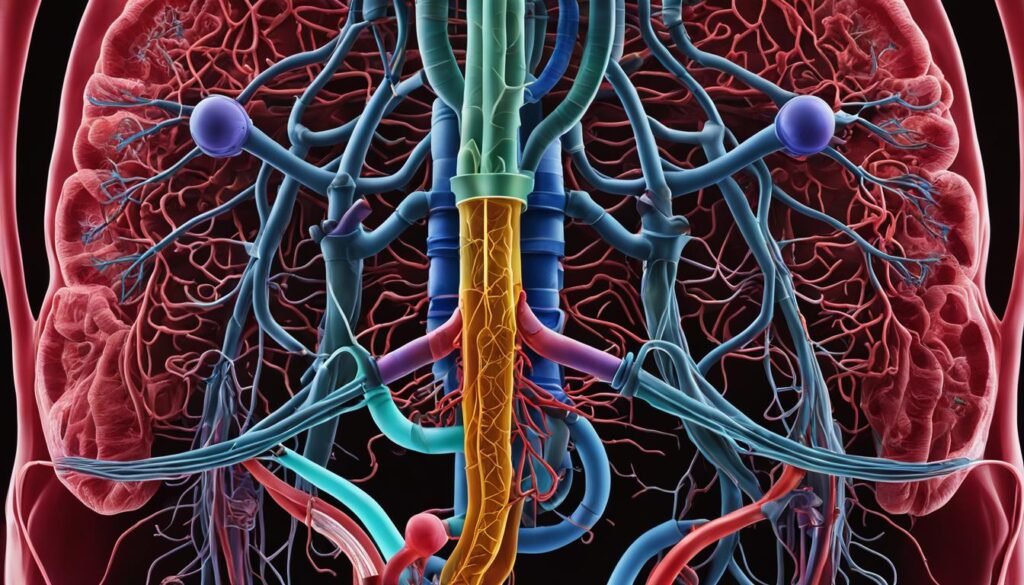
In the medical field, understanding medical terminology is essential for effective communication and accurate documentation. This section delves into the practical application of medical terminology in clinical settings, focusing specifically on the urinary system. By gaining a deeper understanding of the terminology related to this important body system, healthcare professionals can better describe conditions and treatments, ensuring clear and precise communication among colleagues.
The urinary system, also known as the renal system, plays a vital role in maintaining homeostasis by eliminating waste products from the body. It consists of various organs, including the kidneys, bladder, ureters, and urethra. Understanding medical language related to the urinary system is crucial for diagnosing and treating urinary conditions such as urinary tract infections, kidney stones, and urinary incontinence.
By familiarizing yourself with the medical terms and concepts associated with the urinary system, you can enhance your ability to work effectively in the medical field. Whether you’re a physician, nurse, medical assistant, or other healthcare professional, a robust knowledge of medical terminology is essential for accurate diagnosis, treatment, and patient care.
| Benefits of Understanding Medical Terminology in Clinical Settings |
|---|
| 1. Accurate Documentation: Proper use of medical terminology ensures clear and concise documentation of patient history, assessments, and treatment plans. |
| 2. Efficient Communication: By speaking a common medical language, healthcare professionals can effectively communicate with colleagues, improving collaboration and patient outcomes. |
| 3. Diagnostic Skills: Understanding medical terminology aids in identifying and interpreting diagnostic tests, enabling accurate diagnosis of urinary conditions. |
| 4. Treatment Planning: Familiarity with medical terminology helps healthcare professionals develop appropriate treatment plans for urinary disorders, ensuring optimal patient care. |
Medical Terminology Specialization
For those seeking advanced training in medical terminology, specialized courses and certifications are available. These programs provide in-depth knowledge and skills specific to medical language, allowing professionals to further specialize in their field. Specializations may include areas such as cardiology, gastroenterology, or dermatology, among others.
By pursuing a medical terminology specialization, healthcare professionals can enhance their expertise and expand their career opportunities. Specialized knowledge in medical language equips professionals with the ability to navigate the terminology specific to their field, improving patient care and facilitating effective communication within their specialty.
Understanding medical terminology and its application in clinical settings is a foundational aspect of a successful healthcare career. The knowledge gained in this section will empower you to confidently navigate the intricate language used in the medical field, ensuring accurate documentation, effective communication, and exceptional patient care.
Advanced Concepts in Medical Terminology
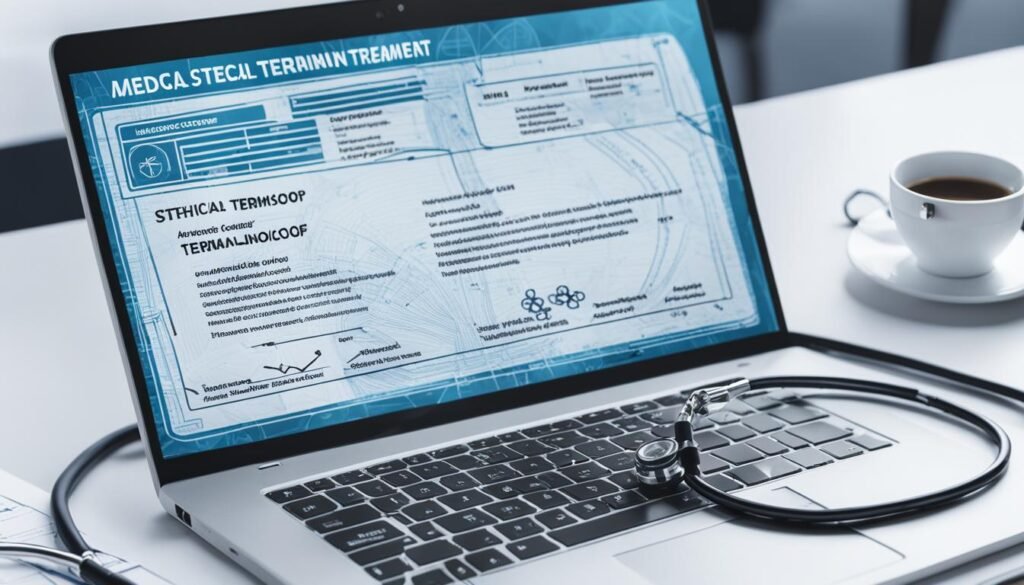
In this section, we will explore advanced concepts in medical terminology that can take your understanding to the next level. By delving deeper into the intricacies of medical language, you can enhance your expertise in the field and unlock new opportunities in your career.
Medical Terminology Certification
One way to demonstrate your proficiency in medical terminology is by obtaining a medical terminology certification. This credential validates your knowledge and skills in medical language and can significantly enhance your credibility in the healthcare industry. By earning a medical terminology certification, you can set yourself apart from others and showcase your dedication to professional development.
Options for Medical Terminology Classes
If you’re interested in expanding your knowledge of medical terminology, there are various options for taking classes. One popular choice is to enroll in medical terminology classes, which provide structured learning experiences and expert guidance. These classes are offered both online and in-person, allowing you to choose the format that suits your learning preferences and schedule. Online medical terminology classes, in particular, offer the flexibility and convenience of self-paced learning, making them accessible to busy healthcare professionals or individuals with other commitments.
Earn a Certificate in Medical Terminology
By completing this section, you will have the opportunity to earn a certificate in medical terminology, further validating your expertise and dedication to the field. This certificate can serve as a tangible proof of your knowledge and can be a valuable addition to your professional portfolio. Whether you’re looking to advance in your current healthcare role or explore new career opportunities, a certificate in medical terminology can be a significant asset.
Take the next step in your medical terminology journey by diving into advanced concepts, earning a certification, and expanding your career prospects. With our comprehensive course and expert instruction, you can achieve mastery in medical terminology and unlock a world of possibilities in the healthcare industry.
Exploring Specialized Medical Terminology

Specialization in medical terminology is essential for professionals seeking to enhance their healthcare knowledge and communication skills. Whether you’re aiming to pursue a career in a specific medical field or simply want to expand your understanding of medical language, exploring specialized medical terminology can provide valuable insights and opportunities.
The Benefits of Specialized Medical Terminology Courses
There are various options available when it comes to learning specialized medical terminology. You can find courses near you or opt for online programs that offer flexibility and convenience. These courses offer in-depth knowledge and insights into the terminology specific to different medical fields, allowing you to develop a comprehensive understanding of the subject matter.
“Specialized medical terminology courses enable professionals to gain expertise in the language used within their specific field of practice. This knowledge not only enhances their ability to communicate effectively with colleagues but also ensures accurate and efficient patient care.”
By enrolling in a medical terminology course near you or online, you’ll gain access to comprehensive course content that covers the specific terminology, abbreviations, and concepts relevant to your chosen medical field. Whether you’re interested in oncology, cardiology, pediatrics, or any other specialty, these courses will provide the knowledge and skills you need to excel in your career.
The Value of Continuing Education in the Medical Field
Continuing education is crucial for healthcare professionals seeking to stay up-to-date with the latest advancements in their field. By pursuing a medical terminology course, you’ll demonstrate your commitment to ongoing learning and professional development.
Continuing education in the medical field not only helps you stay current with industry trends but also increases your marketability and opens doors to new job opportunities. Employers value professionals who invest in their education, and a specialized medical terminology course can set you apart from your peers.
Expand Your Knowledge with a Medical Language Course
While specialized medical terminology courses focus on the language used in specific medical fields, it’s also beneficial to explore the broader aspects of medical language. A medical language course provides a comprehensive understanding of medical terms, their origins, and their common prefixes and suffixes.
By immersing yourself in a medical language course, you’ll gain a deeper appreciation for the intricacies of medical terminology and develop a universal understanding of medical language across various specialties. This comprehensive knowledge will not only enhance your communication skills but also help you navigate complex medical documents and engage in meaningful discussions with healthcare professionals.
Overall, exploring specialized medical terminology through courses available near you or online is a valuable investment in your healthcare career. It allows you to gain expertise in your chosen medical field, stay current with industry advancements, and communicate effectively with colleagues and patients. Consider enrolling in a medical terminology course today to unlock the many benefits it has to offer.
Enhancing Communication in Healthcare

Effective communication is crucial in the healthcare field, and medical terminology plays a vital role in facilitating clear and accurate communication. When communicating with healthcare professionals, particularly doctors, it is essential to have a strong grasp of medical terms and abbreviations.
By improving your skills in medical terminology, you can enhance your ability to engage in meaningful discussions and relay important information. This will enable you to effectively communicate with doctors and other healthcare professionals, ensuring that accurate and relevant information is conveyed.
Understanding medical terms and abbreviations allows you to speak the same language as healthcare professionals, making it easier to collaborate and work together in providing optimal patient care. Moreover, effective communication fosters trust and confidence between patients and healthcare providers, leading to better healthcare outcomes.
By enrolling in our medical terminology course, you will gain the knowledge and expertise needed to communicate effectively in the healthcare setting. Our course covers the essential terms and abbreviations used in medical practice, providing you with the tools to confidently communicate with doctors and navigate complex medical discussions.
Whether you are a healthcare professional looking to strengthen your communication skills or an individual interested in pursuing a healthcare career, improving your skills in medical terminology is invaluable. Don’t miss out on the opportunity to enhance your communication abilities – enroll in our medical terminology course today.
– Dr. Margaret Thompson, Chief of Staff at ABC Hospital
Mastering Medical Vocabulary
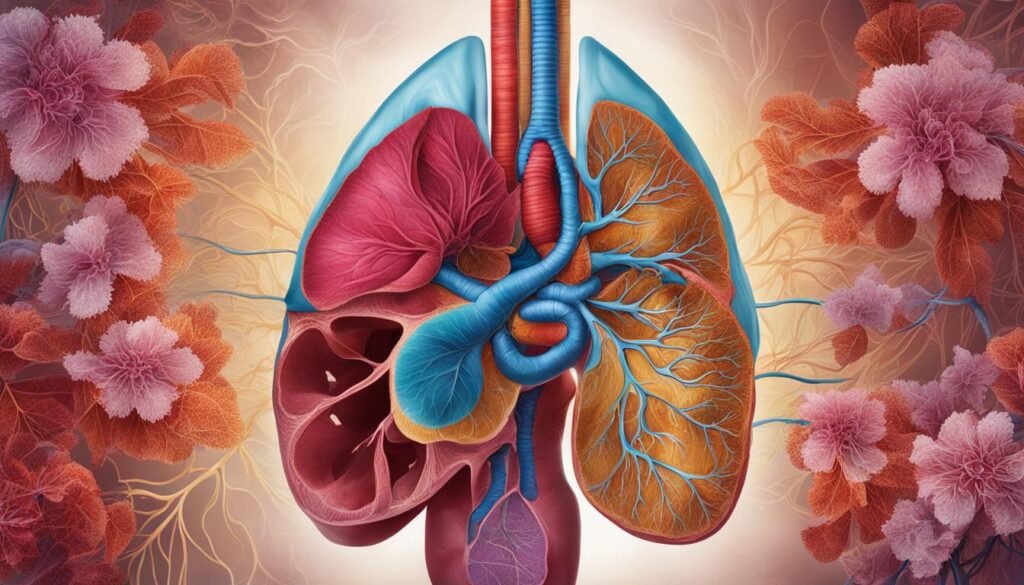
This section is dedicated to mastering medical vocabulary. In the medical field, the use of specific terminology is crucial for effective communication and understanding. By expanding your medical vocabulary, you will gain the language skills necessary to navigate the complex terminology used in medical settings and enhance your overall comprehension of medical concepts.
One of the key aspects of mastering medical vocabulary is familiarizing yourself with the terms used in important body systems. These systems play a vital role in the functioning of the human body, and understanding their terminology is essential for healthcare professionals.
Let’s take a closer look at some important body systems and the medical vocabulary associated with them:
Musculoskeletal System
The musculoskeletal system consists of muscles, bones, and joints, and it enables movement and provides support to the body. Understanding the medical vocabulary related to this system will help you accurately describe various conditions and injuries.
Cardiovascular System
The cardiovascular system includes the heart and blood vessels, and it is responsible for transporting oxygen, nutrients, and waste products throughout the body. Familiarizing yourself with the medical terms associated with this system will allow you to communicate effectively about cardiovascular health and related conditions.
Respiratory System
The respiratory system is responsible for the exchange of gases, ensuring that oxygen is taken in and carbon dioxide is eliminated. Learning the medical vocabulary related to this system will enable you to discuss respiratory conditions and treatments with clarity and accuracy.
Gastrointestinal System
The gastrointestinal system encompasses the organs involved in digestion, including the stomach, intestines, and liver. Acquiring knowledge of the medical terms used in this system will enable you to communicate effectively with colleagues and patients about gastrointestinal disorders and procedures.
These are just a few examples of the important body systems and their associated medical vocabulary. By mastering the terminology used in the medical field, you will become a more proficient and confident healthcare professional.
Remember, effective communication is essential in providing quality healthcare, and having a strong command of medical vocabulary is a key component of this. Take the time to expand your medical vocabulary and become fluent in the terminology used in important body systems.
With that in mind, let’s explore some common terms used in these body systems:
| Musculoskeletal System | Cardiovascular System | Respiratory System | Gastrointestinal System |
|---|---|---|---|
| Orthopedics | Arteries | Alveoli | Colonoscopy |
| Osteoporosis | Veins | Dyspnea | Gastritis |
| Skeletal muscle | Heart attack | Asthma | Endoscopy |
| Tendinitis | Hypertension | Pulmonary | Hepatitis |
By mastering these terms and others like them, you will be equipped with the necessary vocabulary to confidently navigate the medical field and provide excellent patient care.
The Importance of Medical Terminology in Healthcare Careers
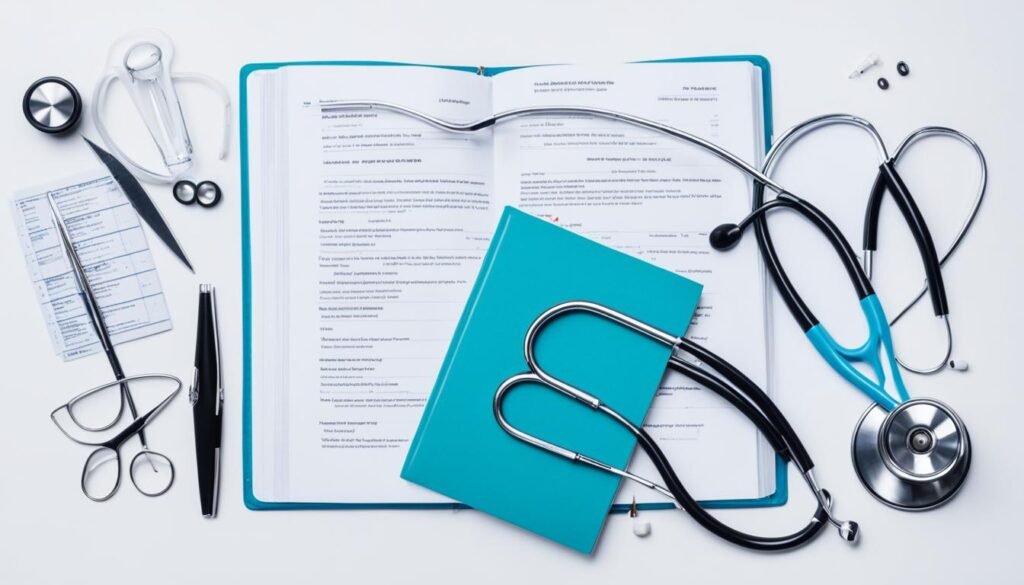
When it comes to pursuing a career in the medical field, having a strong foundation in medical terminology is crucial. Whether you aspire to become a doctor, nurse, medical assistant, or any other healthcare professional, understanding medical terminology is essential for effective communication and successful patient care.
Our comprehensive medical terminology program is designed to equip you with the necessary knowledge and skills to navigate the complex language of medicine. By enrolling in our program, you can gain a deep understanding of medical terminology, enabling you to accurately interpret medical records, communicate with colleagues, and provide optimal healthcare services.
Completing our medical terminology program can open doors to a range of exciting career opportunities in the medical field. With a solid grasp of medical terminology, you will stand out among job applicants and demonstrate your commitment to professional development.
“A well-versed healthcare professional is an asset to any healthcare team. Proficiency in medical terminology enables clear and concise communication, ensuring the delivery of quality care.”
During the program, you will learn the language of medicine, including word roots, prefixes, suffixes, and abbreviations that form the basis of medical terms. This knowledge will enhance your ability to understand and interpret medical documentation, communicate effectively with peers, and collaborate with interdisciplinary teams.
Moreover, a thorough understanding of medical terminology allows you to participate in medical research, contribute to medical publications, and stay up to date with the latest advancements in healthcare. It empowers you to engage in meaningful discussions with colleagues and actively contribute to patient care plans.
The Value of Our Medical Terminology Program
Our medical terminology program goes beyond basic memorization of terms. We provide an in-depth understanding of medical language and its application in various healthcare settings. Through interactive learning materials, quizzes, and real-world scenarios, you will develop practical skills that directly translate to the workplace.
By enrolling in our program, you will:
- Gain a comprehensive understanding of medical terminology
- Enhance your ability to interpret medical records and documentation
- Improve communication with healthcare professionals
- Enter the medical field with confidence and competence
- Expand your career prospects
Investing in a medical terminology program is a valuable step towards advancing your career in the medical field. Our program is designed to meet the needs of aspiring healthcare professionals like you, providing you with the knowledge and skills necessary to excel in your chosen path.
Don’t miss out on the opportunity to pursue a career in the medical field. Enroll in our medical terminology program today and embark on a fulfilling journey towards becoming a healthcare professional.
Course Assessment and Certification
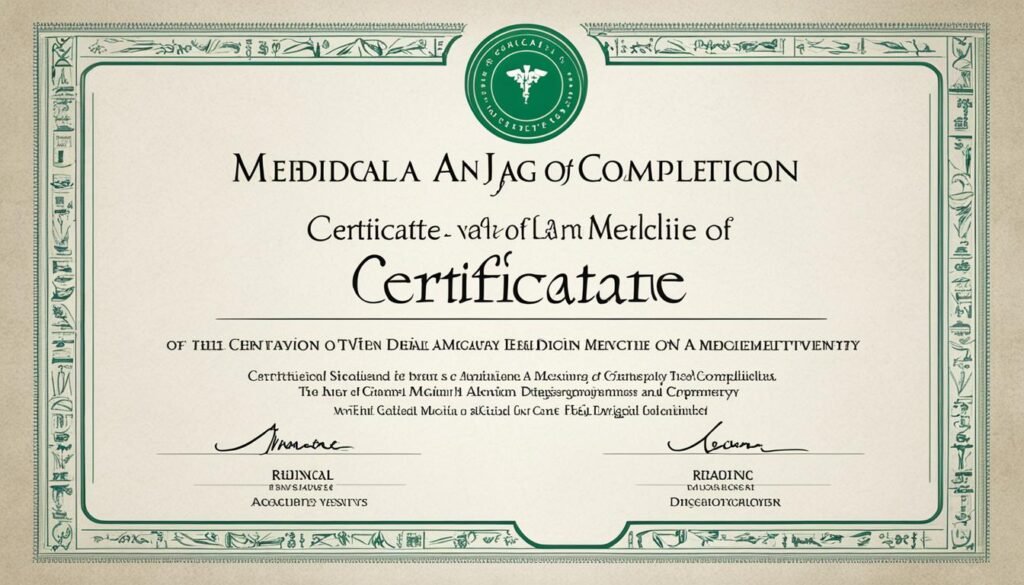
In order to successfully complete our comprehensive medical terminology course, you will need to meet the course requirements and complete the assessments throughout your learning journey. These assessments are designed to test your understanding of medical terminology and ensure that you have acquired the necessary knowledge and skills to confidently navigate medical language in the healthcare field.
Throughout the course, you will encounter various types of assessments, including quizzes, assignments, and practical exercises. These assessments will cover different aspects of medical terminology, such as identifying word parts, interpreting medical abbreviations, and analyzing medical terms within context.
By actively participating in the assessments and demonstrating your proficiency, you will be on track to complete the course successfully. Our aim is to provide you with a comprehensive and rigorous learning experience that prepares you for real-world scenarios and challenges within the medical field.
Upon completion of the course and meeting the assessment criteria, you will receive a certificate of completion. This certificate validates your achievement and serves as proof of your proficiency in medical terminology. It is a valuable credential that can enhance your professional profile and open doors to a wide range of opportunities within the healthcare industry.
In addition to the certificate, you will also gain the confidence and expertise needed to effectively communicate with healthcare professionals, understand medical documentation, and contribute to the overall delivery of quality healthcare services.
Embark on this transformative journey and complete our medical terminology course to unlock new career prospects and enhance your understanding of medical language. Enroll today and earn your certificate of completion.
Also Read : Understanding What Are Merit Based Scholarships
Conclusion
In conclusion, our medical terminology course offers a comprehensive and self-paced learning experience that is ideal for individuals interested in healthcare careers or seeking to improve their understanding of medical language. By enrolling in our course, you can gain the knowledge and skills necessary to navigate medical terminology confidently and communicate effectively in the healthcare field. With a certificate of completion from our top-ranked Rice University, you can enhance your credentials and advance your career in the medical field.
FAQs
Q: What is a medical terminology course?
A: A medical terminology course is designed to teach students the language used in the healthcare field, including medical terms, abbreviations, and terminology usage.
Q: What does the online medical terminology course include?
A: Our online medical terminology course includes comprehensive study materials, interactive exercises, quizzes, and access to a supportive online community.
Q: Who can benefit from taking a medical terminology course?
A: Anyone looking to work in the medical field, such as pre-med students, healthcare professionals, or individuals interested in expanding their knowledge of medical terminology, can benefit from this course.
Q: Is there a certificate of completion offered for the course?
A: Yes, upon successful completion of the course, a certificate of completion will be awarded, which can be a valuable addition to your resume or portfolio.
Q: Is there a free medical terminology course available?
A: Yes, we offer a free medical terminology course for those who want to get a basic understanding of medical terms and be able to communicate effectively in a medical environment.
Q: Can I take the medical terminology course on Coursera?
A: Yes, our medical terminology course is available on Coursera, offering a flexible and self-paced learning experience for participants.
Q: What topics are covered in the medical terminology course?
A: The course covers a wide range of medical terms and related topics, including anatomy and physiology, pharmacology, and basic medical terminology used in the healthcare industry.
Q: Is the medical terminology course self-paced?
A: Yes, the course is designed to be self-paced, allowing participants to study and complete the course at their own convenience and schedule.
Q: Is the course ideal for beginners in the medical field?
A: Yes, the course is ideal for beginners who want to familiarize themselves with medical terminology and enhance their understanding of the language used in the medical profession.
Q: Do I need any prior knowledge to enroll in the medical terminology course?
A: No prior knowledge is required to enroll in the medical terminology course, making it accessible to anyone with an interest in the world of medical terminology.
Source Links
- https://online.rice.edu/courses/medical-terminology-online-course
- https://www.coursera.org/courses?query=medical terminology
- https://www.coursera.org/specializations/medicalterminology




